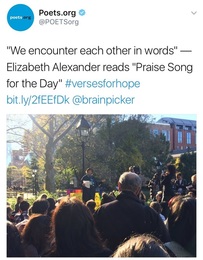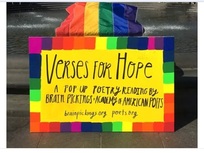| “Sticks and stones may break my bones, but words will never hurt me.” That statement was first uttered in 1869 by newspaper editor Bonzo K. Skilton just after he was found guilty of libel due to a defamatory editorial he wrote against Mother Superior Editha Slator Starrl Skilton claimed that the Mother Superior had unfairly expelled Sister Susan Saurin from the convent for “eating strawberries and cream” and for “being ‘excited’ in the presence of a visiting priest.” Can words hurt someone? In the case of Mr. Skilton, who was stoned to death immediately following his conviction, both his words and the subsequent weight of the stones hurt him. What is it about words, though? Are they “just words” and nothing more, as asserted by Donald Trump’s campaign team after being questioned about their candidate’s spiteful vitriol. Or is there something weightier and more meaningful about words? “We encounter each other in words,” said poet Elizabeth Alexander in her inaugural poem for Barrack Obama, “Praise Song for the Day.” She recently read that poem at “Verses for Hope,” a pop-up poetry reading sponsored by the Academy of American Poets. Surely the crowd present at that event would think that our daily encounters with language are more than meaningless exchanges with “just words.” Alexander’s complete poem is HERE. |
A word is dead
When it is said,
Some say.
I say it just
Begins to live
That day.
Are words “just words,” nothing more, and “dead” once they are said? Or do words, whether “spiny or smooth, whispered or declaimed” live to be considered and reconsidered?
Join us throughout the month of December as we examine and review the “Words of the Year,” the words that defined 2016, the words that have revealed our mood, our character, and our spirit. Our countdown can be found HERE.
We here at the Emmett Lee Dickinson Museum side more with Emily Dickinson’s and Elizabeth Alexander’s views on words. We recognize the power and the capacity that words have. Some of the words we have encountered lately, though, have weighed heavily on our minds and spirit, so for a time in 2017 perhaps we might “distance ourselves” from the News and all of the newscasters' words as advised by Emmett Lee Dickinson in his now-classic poem “A Word dropped often on the News” (below on the left). His poem inspired third cousin Emily Dickinson to pen her poem “A Word dropped careless on a Page” (below on the right).
Most likely, our hiatus from the news will be for just a short while, though, because we certainly don’t want to miss out on any words that might top our “Words of the Year” list in 2017!
| By Emmett Lee Dickinson: A Word dropped often on the News Does stimulate the ire When folded in perpetual stream Of Cable News shows’ fire Inflection in their sentences breed A feeling of Despair We need to distance Ourselves Or take the shows Off Air – | By Emily Dickinson: A Word dropped careless on a Page May consecrate an eye When folded in perpetual seam The Wrinkled Author lie Infection in the sentence breeds We may inhale Despair At distances of Centuries From the Malaria – |


 RSS Feed
RSS Feed
